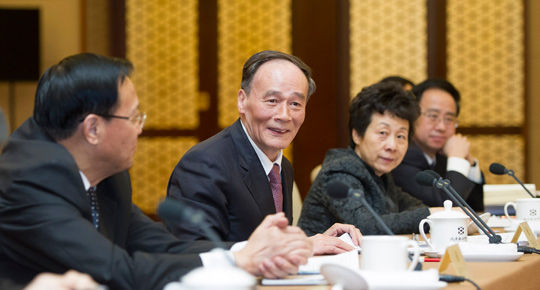A series of animated graphics at South China Morning Post shows the gathering momentum and tactical maneuvering of Xi Jinping’s corruption crackdown over the past two years. It focuses on the investigation of former Politburo Standing Committee member Zhou Yongkang, which failed to culminate at last month’s law-themed Fourth Plenum as anticipated.
Li Qiang, the Communist Party boss of an eastern coastal city in China, was wrapping up a speech on corruption on the morning of September 17 when an ominous group of men appeared
[…] As he was about to leave, Li, the municipal party secretary of Lianyungang in Jiangsu province, was whisked away by the investigators. By afternoon, the CCDI had announced his detention under suspicion of “serious discipline violations” – party speak for graft. That was the last time the public saw Li.
He is just one among almost 75,000 party members who have been investigated by the CCDI and its regional units since President Xi Jinping rose to power at the end of 2012.
[…] “The problem is the criteria [on what constitutes corruption] are too high, no official in China could pass these criteria,” Bo [Zhiyue of the National University of Singapore] said. “These are not solely cases of corruption, they’re political judgment calls.” [Source]
Nevertheless, the anti-corruption campaign has been warmly received by the public—sometimes too warmly. From South China Morning Post’s Patrick Boehler:
Party graft inspectors said on October 15 that Feng Lixiang, the 57-year-old Communist Party secretary of Datong, was investigated on suspicion of corruption, only one day after he chaired an anti-corruption meeting.
The announcement seemed to have energised Feng’s critics in the city, and large crowds soon gathered in front of the local Communist Party headquarters, with many residents setting off fireworks, singing the national anthem, and parading with banners which praised the Party and condemned corrupt officials.
Some were hauled away by police from the scene, according to media reports. [Source]
Meanwhile, Reuters’ Michael Martina reports the creation of a new office to spearhead prosecutions:
Weak organizational structure and staffing limitations have plagued prosecutors’ handling of corruption cases, Qiu Xueqiang, the Supreme People’s Procuratorate (SPP) deputy procurator-general, told the official Xinhua news agency.
The ruling Communist Party has approved the establishment of a new anti-corruption general office under the prosecutor to fix those weaknesses, the Xinhua report published late on Sunday citied Qiu as saying.
The reforms would allow the SPP “to concentrate its energy to directly investigate big and important cases … and effectively break through institutional barriers in handling cases”, Qiu said. [Source]
The lion’s share of the investigations will continue to fall outside the legal system to the Party’s own opaque and abuse-prone Central Commission for Discipline Inspection. A formal statement from the Fourth Plenum confirmed as much, saying: “Governance according to the law requires that the Party governs the country on the basis of the Constitution and the laws, and requires that the Party […] governs the Party according to intra-Party regulations.”








